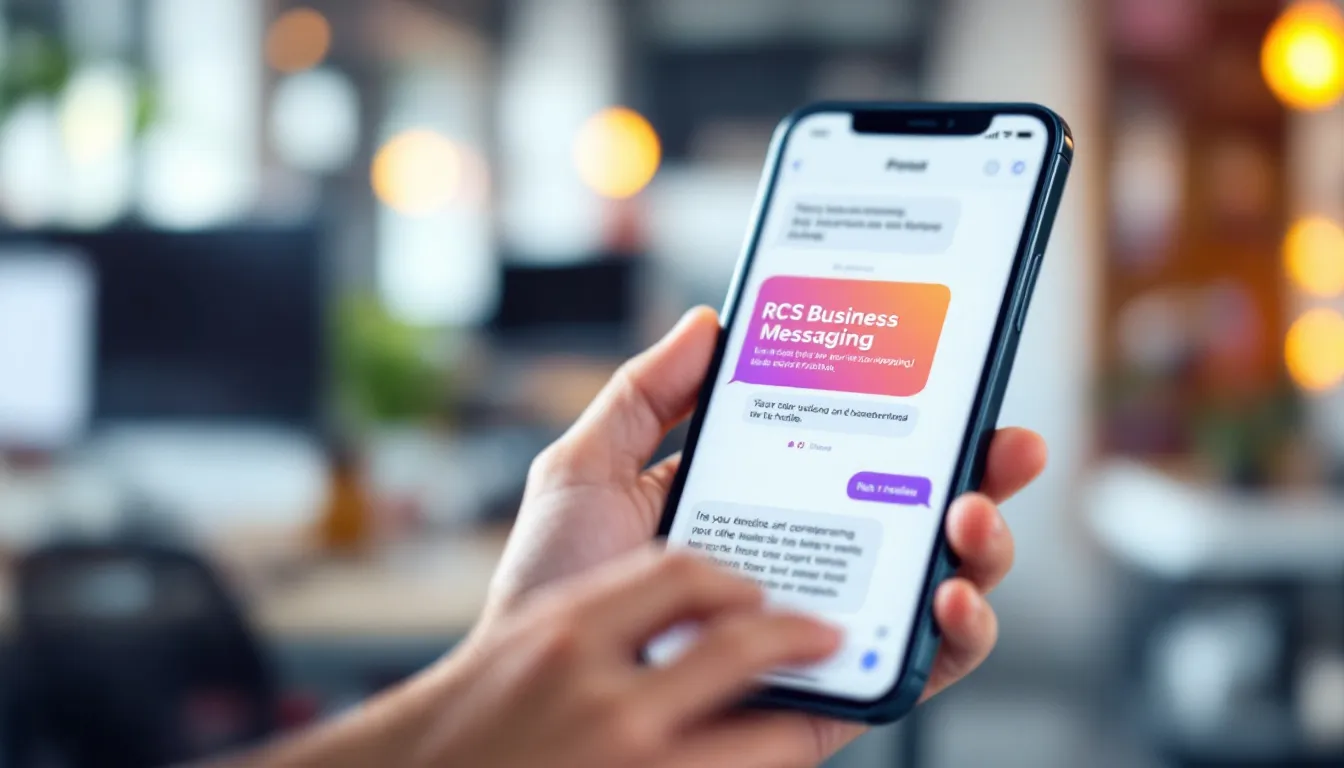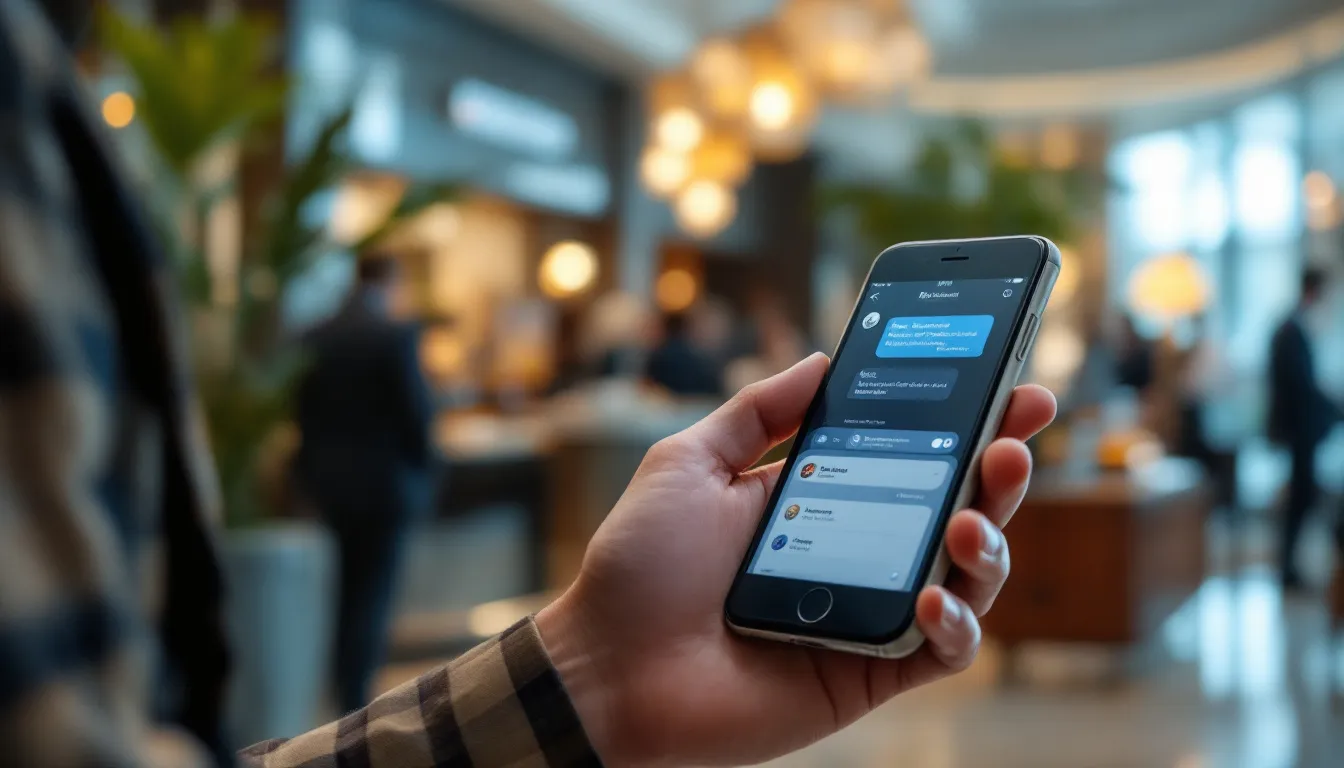Integrating RCS Business Messaging in Travel and Hospitality Loyalty Programs

Understanding RCS Business Messaging
Rich Communication Services (RCS) Business Messaging represents the evolution of traditional SMS messaging, providing enhanced capabilities that facilitate more interactive and engaging communication between brands and customers. Unlike standard messaging, RCS allows businesses to send richer media formats such as images, videos, and carousels, creating a more visually appealing experience.

This advanced messaging framework not only supports multimedia elements but also enables real-time interactions, making it an ideal choice for sectors like travel and hospitality. Customers can receive crucial information such as booking confirmations, itinerary changes, and personalized offers directly to their mobile devices, enriching the customer experience. Additionally, RCS can incorporate interactive elements such as buttons for immediate actions, allowing users to confirm bookings or access promotional content with just a tap, thereby streamlining the user journey and reducing friction in the communication process.
The Basics of RCS Business Messaging
At its core, RCS aims to provide a more robust messaging platform that allows brands to engage with customers effectively. The key features include branded messaging, quick reply options, and rich media support, enabling companies to create immersive conversations. Implemented alongside artificial intelligence, RCS can facilitate automated responses and streamline customer service, ensuring that inquiries are handled promptly. This integration of AI not only enhances responsiveness but also allows for personalized interactions based on user behavior and preferences, making each conversation feel more tailored and relevant.
Furthermore, RCS integrates seamlessly with existing CRM systems, allowing for better customer relationship management. By leveraging data insights through RCS, businesses can tailor their communication strategies, ensuring that messages resonate with particular audience segments. The ability to analyze customer interactions in real-time means that brands can adapt their messaging on-the-fly, optimizing engagement and improving overall campaign effectiveness. This data-driven approach empowers businesses to refine their marketing efforts continuously, ensuring that they meet the evolving needs of their customers.
Benefits of RCS Business Messaging
There are significant benefits associated with utilizing RCS Business Messaging within your marketing strategies. First and foremost, it enhances customer engagement rates. RCS messages boast higher open and response rates compared to traditional SMS, making it an effective tool for customer retention. The interactive nature of RCS also encourages users to spend more time engaging with the content, leading to deeper brand connections and increased likelihood of repeat interactions.
Another advantage is the ability to provide rich, interactive experiences that drive action. For instance, a customer can book a hotel room, change their reservation, or even make dining arrangements all through a single messaging thread. This convenience leads to increased customer satisfaction and loyalty. Moreover, RCS allows businesses to implement rich analytics, enabling them to track user engagement metrics such as click-through rates and conversion statistics. This data not only helps in assessing the effectiveness of campaigns but also provides invaluable insights into customer preferences, allowing brands to refine their offerings and communication strategies further.
The Role of RCS in Travel and Hospitality Industry
The travel and hospitality industry thrives on timely and effective communication. RCS Business Messaging plays a crucial role by enabling real-time updates and fostering meaningful interactions. From the moment a customer books their travel to the point of departure and beyond, the need for seamless communication is paramount.

Enhancing Communication in Travel and Hospitality
In this fast-paced industry, RCS caters to the immediacy required for customer communication. For example, airlines can notify passengers about flight delays or gate changes instantaneously, minimizing frustration and confusion. Hotels can confirm bookings or inform guests about special promotions or amenities, directly engaging customers through a medium they often use.
This instant and direct line of communication not only keeps customers informed but also demonstrates a brand's commitment to customer service, which is crucial in a competitive landscape. Furthermore, RCS enables businesses to send rich media content, such as images of hotel rooms or videos showcasing local attractions, enhancing the overall customer experience. This visual engagement can significantly influence a customer's decision-making process, making them more likely to choose a specific service or destination.
Personalizing Customer Experience with RCS
Personalization is another vital element in enhancing customer experience within the travel and hospitality sectors. RCS allows brands to tailor messages based on individual preferences and past behaviors. For example, a travel company might offer personalized vacation packages targeting frequent travelers to specific destinations.
Through RCS, businesses can collect valuable data regarding customer interactions, which in turn can be used to predict future preferences and behaviors. This data-driven approach facilitates a more personalized experience, ultimately leading to increased customer loyalty and satisfaction. Additionally, RCS can facilitate post-trip engagement, allowing companies to follow up with customers for feedback or offer discounts on future bookings, thereby maintaining a connection long after the initial service has been rendered. This ongoing dialogue not only reinforces brand loyalty but also encourages repeat business, making it an essential strategy for success in the travel and hospitality industry.
Loyalty Programs in Travel and Hospitality
Loyalty programs are fundamental to retaining customers in the travel and hospitality industry. They serve as an incentive for repeat business, encouraging customers to stay loyal to a specific airline, hotel chain, or travel service. These programs can range from offering points for every dollar spent to exclusive member-only discounts and benefits.
Importance of Loyalty Programs
The significance of loyalty programs cannot be overstated. They help build long-term relationships with customers, leading to sustained revenue. As customers accumulate points, they feel a sense of accomplishment that encourages them to choose the same brand repeatedly.
Moreover, loyalty programs help in acquiring customer data that businesses can leverage to enhance their marketing strategies. By understanding the purchasing patterns of loyal customers, brands can better tailor their offerings and communication. This data-driven approach not only improves customer satisfaction but also helps businesses identify trends that can inform future product development and service enhancements.
Key Features of Effective Loyalty Programs
Successful loyalty programs typically exhibit several key features. First, they should be easy to understand and enroll in, removing any potential barriers to entry. Additionally, having a well-defined rewards structure encourages participation and engagement.
- Customizable rewards based on customer preferences.
- Clear communication about how many points are needed for rewards.
- Exclusive offers for loyal customers to create a sense of belonging.
By implementing these features, travel and hospitality brands can create loyalty programs that resonate with their customer base, fostering long-term engagement. Furthermore, incorporating gamification elements, such as challenges or tiered rewards, can enhance the customer experience. This not only makes the process of earning rewards more enjoyable but also motivates customers to engage more frequently with the brand, thereby increasing their overall spending.
Another vital aspect of effective loyalty programs is the integration of technology. Mobile apps and digital wallets can streamline the process of tracking points and redeeming rewards, making it more convenient for customers. Additionally, leveraging social media platforms for promotions and engagement can amplify the reach of loyalty programs, allowing brands to connect with customers in real-time and create a community around their offerings. This multi-channel approach ensures that customers remain engaged and informed about the benefits available to them, ultimately driving loyalty and repeat business.
Integration of RCS Business Messaging into Loyalty Programs
The integration of RCS Business Messaging into loyalty programs can significantly enhance customer interactions and drive engagement. By leveraging RCS features, businesses can communicate loyalty program updates, reward points status, and exclusive offers directly through messaging. This not only streamlines communication but also creates a more dynamic and interactive experience for customers, allowing them to engage with their favorite brands in real-time.

Steps to Integrate RCS Business Messaging
Integrating RCS into loyalty programs involves several important steps:
- Assess the current messaging capabilities and identify RCS requirements.
- Collaborate with a reliable service provider that can facilitate access to RCS capabilities.
- Develop a comprehensive communication strategy that outlines how RCS will be employed within the loyalty program.
- Test the integration with a select audience to gather feedback and optimize features.
Once these steps are executed, businesses can deliver an enhanced experience to their loyal customers, deepening their relationship through personalized interactions. For instance, RCS can enable businesses to send visually rich messages that include images, carousels, and quick reply buttons, making it easier for customers to navigate their loyalty program benefits. This level of interactivity not only captivates customers but also encourages them to take action, such as redeeming points or participating in special promotions.
Potential Challenges and Solutions
Despite the compelling benefits of integrating RCS Business Messaging, challenges may arise during implementation. Technical difficulties, customer opt-in rates, and resource allocation can all pose hurdles. Additionally, businesses must navigate the complexities of ensuring that their messaging remains compliant with privacy regulations and that customer data is handled securely.
To combat these challenges, brands should consider offering clear value propositions that encourage customers to engage with the RCS channel. For instance, providing exclusive rewards for opting into RCS messaging can lead to higher opt-in rates. Furthermore, businesses can create targeted campaigns that highlight the advantages of RCS, such as real-time updates and personalized offers, to entice customers. Additionally, ensuring robust internal training can help staff maximize the effectiveness of RCS in customer engagement. By equipping teams with the knowledge and tools necessary to leverage RCS effectively, businesses can foster a culture of innovation that prioritizes customer satisfaction and loyalty.
The Future of RCS Business Messaging in Loyalty Programs
As technology continues to advance, RCS Business Messaging is poised to play an increasingly vital role in shaping the future of loyalty programs in the travel and hospitality industries. The continued evolution of customer preferences and expectations will drive this change.
Predicted Trends in RCS Business Messaging
Looking ahead, we can anticipate that RCS will further integrate machine learning capabilities, enabling businesses to predict customer needs and behaviors more accurately. Such advancements can lead to even more personalized messaging strategies, ensuring that information and offers are relevant to individual customers. For instance, through analyzing past travel patterns, RCS can suggest tailored vacation packages or exclusive deals that resonate with a customer's unique preferences, enhancing their overall experience.
Additionally, the use of RCS in loyalty programs will likely become more widespread as brands recognize the importance of effective communication in driving customer loyalty. Enhanced features such as rich media content, including images and videos, can be utilized to showcase destinations and experiences, making messages more engaging. This not only captures attention but also encourages customers to interact with the content, fostering a deeper connection with the brand.
Preparing for the Future of Loyalty Programs
To prepare for the future, travel and hospitality brands must remain agile and receptive to new technologies. Investing in advanced communication platforms and continuously evaluating customer engagement strategies will be crucial. Moreover, brands should explore partnerships with tech innovators to stay ahead of the curve and leverage the latest advancements in RCS. For example, collaborating with data analytics firms can provide valuable insights into customer behavior, enabling brands to refine their messaging and loyalty offerings.
Staying updated on emerging trends and consumer preferences will ensure brands can adapt and innovate, keeping their loyalty programs relevant and impactful. As customers increasingly seek seamless and personalized experiences, integrating RCS Business Messaging into their journey will become essential. This could include automated check-ins, real-time updates on flight statuses, or personalized recommendations for local attractions, all delivered through a single, user-friendly messaging platform. Such innovations not only enhance customer satisfaction but also solidify brand loyalty in a competitive marketplace.
In conclusion, integrating RCS Business Messaging into travel and hospitality loyalty programs has the potential to redefine customer engagement. By harnessing these capabilities, brands can create richer, more interactive experiences that promote loyalty and satisfaction, thereby positioning themselves for success in the dynamic future of the industry.
Ready to Elevate Your Loyalty Program with RCS Business Messaging?
Embrace the future of customer engagement with nativeMsg, the RCS Business Messaging Creator. Transform your travel and hospitality loyalty programs into interactive experiences that captivate and delight your customers. With nativeMsg's intuitive platform, you can easily create, send, and optimize rich messaging campaigns that drive loyalty and satisfaction. Don't miss out on the opportunity to boost your engagement rates and conversion statistics. Get Started today and revolutionize the way you connect with your audience.
